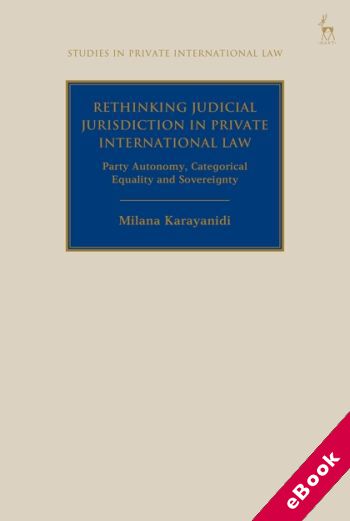
The device(s) you use to access the eBook content must be authorized with an Adobe ID before you download the product otherwise it will fail to register correctly.
For further information see https://www.wildy.com/ebook-formats
Once the order is confirmed an automated e-mail will be sent to you to allow you to download the eBook.
All eBooks are supplied firm sale and cannot be returned. If you believe there is a fault with your eBook then contact us on ebooks@wildy.com and we will help in resolving the issue. This does not affect your statutory rights.
This book explores the theory and practice of judicial jurisdiction within the field of the conflict of laws or private international law. It offers a revised look on values justifying the power of courts to hear and decide cross-border disputes.
It demonstrates that re-conceptualisation of jurisdiction is needed. Rather than deriving from the territorial power of the states, jurisdiction in civil and commercial cross-border matters ought to be driven by party autonomy. Party autonomy can be limited by considerations of categorical equality in view of protecting certain categories of private parties and limited state sovereign interests that are essential to preserve the integrity of the international system.
The book further applies this normative view to the existing rules of jurisdiction in the European Union, the common law, and the Russian Federation. These regimes are chosen because of their unique positions towards values in private international law and contrasting societal norms that generate and accommodate these values. Notwithstanding disparate cultural and political ideas, these targeted regimes reveal a surprising consistency when it comes to enforcement of party autonomy.
There is, nevertheless, room for improvement. Therefore, the book shows to scholars, policy makers and lawmakers that jurisdiction should be re-centred around the interests of private actors. It proposes ways to improve the current rules.